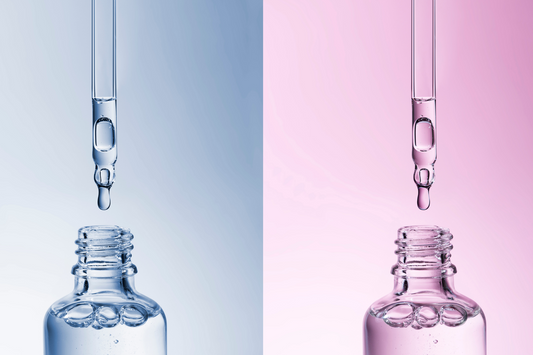As anyone who’s started their hair regrowth journey will tell you, the struggle to find the cause of why your hair isn’t growing can be frustrating. Though hair loss appears to be a simple, singular event, it can have numerous underlying causes, ranging from transitory life events and genetics to the more serious cases of nutritional deficiencies, infections, or disorders like androgenic alopecia.
In many cases, hair loss has no single cause, making finding that silver bullet to defeat your hair loss even more challenging. Fortunately, by monitoring your health, communicating with your doctor, and staying informed about warning signs to look out for, can make it easier to uncover why your hair isn't growing as fast as you’d like.
Let’s recap a few of the broader causes for slower-than-normal hair growth:
The hair’s natural cycle
As part of your hair follicle’s normal lifetime, it progresses through three unique phases: anagen, catagen, and telogen. While hair growth only occurs during the anagen phase, 85-90% of our hair follicles are in the anagen phase at any given time.
When healthy, our hair follicles in each phase are randomly distributed throughout any given part of the scalp, meaning that, on average, our hair feels a consistent length, thickness, and strength. Certain conditions, like androgenic alopecia or telogen effluvium, can change the distribution of hair follicles that are in each phase and can explain why your hair isn't growing, which over time, could manifest as hair loss.
Age and genetics
As we age and transition through different phases of life, our hair follicles eventually begin to slow down, thin, or go dormant. The accumulation of certain hormones called androgens, including testosterone and dihydrotestosterone (DHT), is a natural consequence of this aging process.
The age at which events that can significantly impact hormone levels, like menopause, occur can be determined by a variety of factors, both genetic and environmental. Research has also shown that for a variety of reasons, study participants from different ethnicities had differing growth rates when it came to their hair, meaning that when it comes to why your hair isn't growing, several factors are innate, and part of who we are.
Health and nutrition
While it may appear simple, hair growth is a complex process that depends upon a variety of upstream factors via nutrition that contribute to our overall health. Getting adequate amounts of vitamins C, D, E and the multiple vitamins that make up the B-complex ensures that processes involved in cellular metabolism, growth, and division have the compounds they need.
A diet rich in protein that contains a blend of essential and non-essential amino acids helps to ensure that the structural proteins making up the hair shaft, like keratin, have the building blocks necessary to grow.
Minerals like zinc, magnesium, calcium, and iron can all contribute directly or indirectly to hair growth, as well. To get the nutrients they need, hair follicle cells need to be constantly supplied with oxygen-rich blood cells. Iron—a key component of red blood cells—helps maintain this supply.
Health doesn’t just mean proper nutrition, however. While nutrition can be a major part of maintaining overall health, any activities that can contribute to a fully-functioning body—like moderate exercise and restful sleep—are equally important. Stress—either physical, psychological, or emotional—also puts our bodies into survival mode, meaning that resources and energy get reprioritized to focus on what matters most.
Unfortunately, for many on their hair regrowth journey, our bodies have decided that hair growth gets deprioritized during times of stress, meaning that stress-relieving activities and hobbies may be why your hair isn't growing.
Conditions and disorders
In addition, hair loss can be caused by a variety of named underlying conditions, like androgenic alopecia. Androgenic alopecia occurs when hormones like DHT, known as androgens, accumulate in the scalp and contribute to a premature shrinkage of the hair follicle.
Over time, this shrinkage can cause the follicle to become dormant; when enough follicles go through this transition, bald spots of the scalp can appear—these predictable patches of exposed skin on the scalp make up the different presentations and severity of pattern hair loss. In less severe cases, the your hair may appear like it is thinning and isn't growing. Any underlying condition that can contribute to a worsening of overall health, whether through stress or by contributing to a decline in circulation to the scalp, could contribute to underlying hair loss and poor scalp health.
In certain cases, traumatic events—including physical injuries, psychological stressors, or major life events like pregnancy—can contribute to premature hair shedding through a process known as telogen effluvium. Telogen effluvium may explain why your hair isn't growing, but it is temporary and more often than not, your hair will begin to regrow on its own in a few months. *If it persists, talk to your doctor, as it can present as a chronic condition if lasting longer.
Haircare products, routine, and treatments
Unfortunately, some products and treatments—whether getting a full Brazilian blowout or even just using the straightening iron at a higher temperature—can contribute to stress and trauma that impact the health of the scalp, the hair follicles, and are often a key reason why your hair isn't growing. Also, tight hairstyles and braids, in some cases, can also place strain and traction on the scalp, leading to a type of hair loss known as traction alopecia.
In short, it’s complicated, but not impossible, to know the complete answer
A beautiful head of hair is never as effortless as we want to imagine. Many factors, whether we have control over them or not, can contribute to the underlying health and overall appearance of our hair.
If your hair isn't growing, it is likely due to a variety of factors, ranging from the basic vitamins and minerals we get in our diets to the more complex changes in our mood and health.
If you’re concerned about why your hair isn’t growing, keep in mind that certain changes in the growth of your hair are natural and normal. Keep track of the number of hairs you shed on the pillow and in the shower on a daily basis noting that between 50 to 100 hairs are typically lost on a daily basis.
If you’re concerned about any noticeable hair loss or just looking to boost your overall hair growth, medical and non-medical solutions exist, as well. Products like Revela’s Hair Revival Serum and Growth Concentrate have been clinically proven to contribute to the appearance of fuller, thicker, healthier-looking hair in as little as six to eight weeks. And as always, talk to your doctor about any options that may be right for achieving your hair loss goals.





